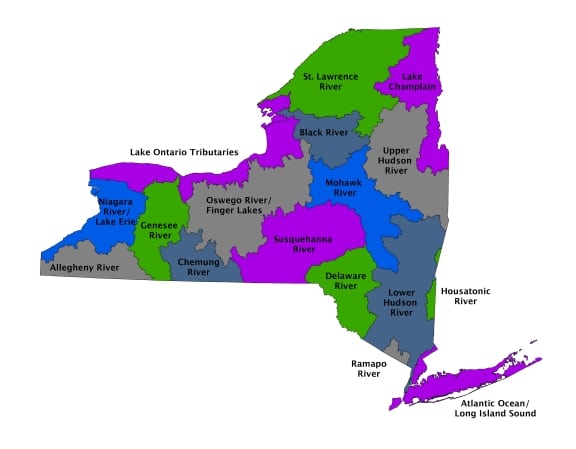Despite last week’s temporary win protecting the Delaware River Basin and its inhabitants from natural gas fracking, the debate rages on in New York State. Lawmakers, industry lobbyists and concerned landowners have debated for over a year about whether or not to open up the state to the Marcellus Shale fracking bonanza.
New York Governor Andrew Cuomo’s stated commitment to vote no in the Delaware River Basin vote was promising, but it is offset by the fact that he has assembled a secretive 18-person “fracking panel” which Food & Water Watch executive director Wenonah Hauter recently alleged is comprised of many “strongly self-interested and industry-biased” individuals. Some environmental groups are concerned that this panel seems rigged to give the green light to fracking in New York.
At previous public hearings, tensions have already run high with both supporters and opponents lining up hours beforehand to ensure their turn to speak out on this highly contentious issue.
Most of the proponents of gas fracking continue to argue the economic mantra of job creation and domestic energy security, even though multiple reviews have debunked the gas industry’s lofty job projections. Food & Water Watch released a report indicating that many of the jobs created would likely be short-term and favor contract workers from outside the state. Other watchdogs of industry rhetoric, including Senator Ron Wyden (D-OR), point out that the industry’s rush to export gas from the fracking boom will lead to much higher gas prices for Americans, contradicting the industry’s alleged commitment to domestic energy security.
There are also important questions about just how much gas there is underneath New York to warrant such extreme energy development. After a recalculation of the resource potential of the area, geologists at the U.S. Geological Survey dropped their estimate of the recoverable gas by a quarter. They determined that the amount of reasonably recoverable gas would only meet US demand for four years instead of sixteen.
Residents who had initially accepted gas leases have since voiced their regret, stating that the lease payments from industry weren’t worth the impacts on their land, water and communities.
Meanwhile, citizens concerned about fracking in upstate regions question the fact that Governor Cuomo is adamant about protecting New York City’s watershed, yet he seems dead set on allowing fracking upstate, in effect creating ‘sacrifice’ zones that would imperil water supplies for upstate communities in favor of protecting city residents.
”I resent the fact that the water of New York City and Syracuse is deemed by the DEC to be more important than the rest of the state,” State Senator James Seward (R-Milford) told The Daily Star newspaper of Oneonta, NY.
“What’s the difference between New York City kids and my kids?” Kim Jastremski of Cooperstown said at one meeting, according to the Wall Street Journal.
Even more discomforting is a page on the DEC’s website attempting to explain “What We Learned From Pennsylvania”. It not only passively admits that mistakes were made in PA, but also seems to loosely translate the problem as, “we screwed up there” but “next time we’ll make it better.”
NYDEC Commissioner Joseph Martens believes that fracking can be undertaken safely in certain areas despite reports questioning the effectiveness of any of the state’s proposed regulations.
Perhaps the Commissioner and Governor should visit the DEC website more often. Ironically, there’s a whole page dedicated to NY State’s watersheds entitled, “We All Live in a Watershed” that shows every inch of the state belonging to some kind of watershed. If that’s the case, and Governor Cuomo actually intends to stand by his word of “keeping fracking out of the watershed,” he should clarify why he’s leaving most of the state’s watersheds vulnerable to contamination from fracking upstate.
Next add NYC Mayor Bloomberg to the mix, whose $50 million donation to the Sierra Club to take on Big Coal is laudable, but some have questioned whether it was, in part, a strategic attempt to gain support for gas extraction by pitting dirty coal against “clean” gas.
“At least natural gas is better than coal!! Do you really want coal?” Mayor Bloomberg said recently, trying to turn this into some kind of false, fossil fuel Sophie’s choice.
It’s true that gas-fired power plants release less carbon dioxide, but that’s only part of the picture. Studies that have attempted to take into account the full life-cycle impact of gas development, including potent methane emissions into the atmosphere during the drilling and transportation phases, indicate that gas may in fact pollute the air much more than coal and oil.
Bloomberg has also referred to natural gas as an “alternative” energy source, attempting to equate this dirty fossil fuel with wind, solar and other renewables. While it is an “alternative” energy in that it is a difference choice from coal, it is still a filthy form of reckless energy that threatens our water, air quality and the global climate.
Many citizens are waking up to the fact that the gas fracking rush is not a true solution to our energy problems. Switching from coal to gas still leaves us addicted to dirty fossil fuels, when the real solution is to focus on transitioning to a truly clean energy future that will create better jobs and safeguard our communities against the pollution threats that all fossil fuels pose.
The fireworks are sure to continue at public hearings this week in Loch Sheldrake and New York City on Tuesday and Wednesday, respectively.
Subscribe to our newsletter
Stay up to date with DeSmog news and alerts






